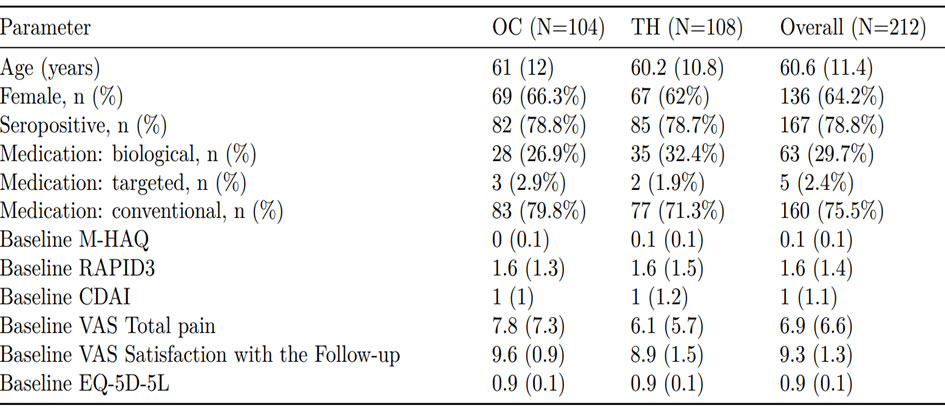Session Information
Session Type: Abstract Session
Session Time: 8:00AM-9:00AM
Background/Purpose: Most Rheumatoid Arthritis (RA) patients are in remission or low disease activity. Yet, RA patients continue to be followed up by pre-scheduled visits, which may compromise accessibility for the sickest and, thus, quality of care. A Patient-Reported Outcome (PRO)-based telehealth (TH) follow-up among RA patients achieved similar disease control as conventional outpatient (OC) follow-up (1).This study compared the effect of a PRO-based TH to a pre-scheduled OC follow-up to monitor disease activity in Norwegian RA patients (TH follow-up was not inferior to OC follow-up).
Methods: Patients with RA in remission or low disease activity defined as a Routine Assessment of Patient Index Data 3 (RAPID3) < 6 were recruited at the Martina Hansens Hospital, Bærum, Norway, between May and June 2020. The patients were randomized to follow-up by either TH or OC. The primary endpoint was an occurrence of flare within 52 weeks, defined as a RAPID3 score of >6 at any measurement between randomization and 52 weeks. All patients, with a reported RAPID3 score >6 were evaluated by a rheumatologist who decided if they had a clinical flare. The occurrence of clinical flare, and satisfaction rates with the follow-up procedures (measured by a Visual Analogue Scale –VAS) among the two patient groups were also compared. The primary endpoint was analyzed using logistic regression adjusted for baseline scores and serotype.
Results: Two hundred twelve patients were recruited, 104 in the OC arm and 108 in the TH arm. All patients fulfilled the ACR/EULAR 2010 classification criteria for RA. The baseline characteristics are presented in Table 1.
Based on RAPID3, 11 patients (5%) flared in the OC group while 27 patients flared in the TH group (13%), with an adjusted risk difference (ARD) of 0.14 (95% CI 0.04- 0.23). Thus, the primary objetive (non-inferiority of the TH group) was not met. Regarding the clinical flare, ten patients (5%) had a clinical flare in the OC group compared to 15 patients (7%) in the TH group (ARD 0.04 (95% CI -0.05-0.13). The mean VAS satisfaction scores at 12 months in TH and OC groups were 8.8 and 9.8, respectively, with an estimated adjusted mean difference (TH-OC) of -0.82 (-1.19, -0.47). Thus, the satisfaction with the follow-up at 12 months was significantly lower in the TH group. The main reason for the lower satisfaction rates in the TH group was the procedure to log in to the application, which many patients found complicated.
Conclusion: TH follow-up seems to have a significantly higher flare rate than the OC follow-up. Yet, no difference was observed concerning clinical flares. One explanation for the higher flare rate defined by the RAPID3 score is that many of the issues reported through the app were not attributed to RA (e.g., osteoarthritis pain). The lower satisfaction rates in the TH group illustrate that technological solutions need to be patient-friendly.
To cite this abstract in AMA style:
Bull Haaversen A, Olsen I, Pesonen M, Diamantopoulos A, Sundsby karlengen j. Telehealth versus Outpatients Clinic Follow up in Rheumatoid Arthritis Patients a Randomized Controlled Study [abstract]. Arthritis Rheumatol. 2022; 74 (suppl 9). https://acrabstracts.org/abstract/telehealth-versus-outpatients-clinic-follow-up-in-rheumatoid-arthritis-patients-a-randomized-controlled-study/. Accessed .« Back to ACR Convergence 2022
ACR Meeting Abstracts - https://acrabstracts.org/abstract/telehealth-versus-outpatients-clinic-follow-up-in-rheumatoid-arthritis-patients-a-randomized-controlled-study/

